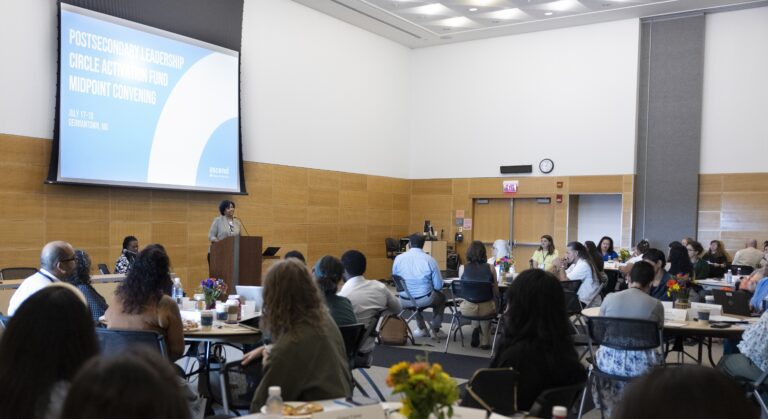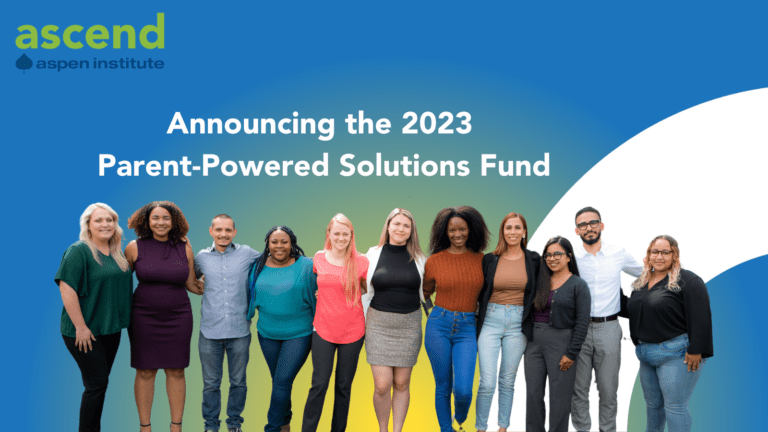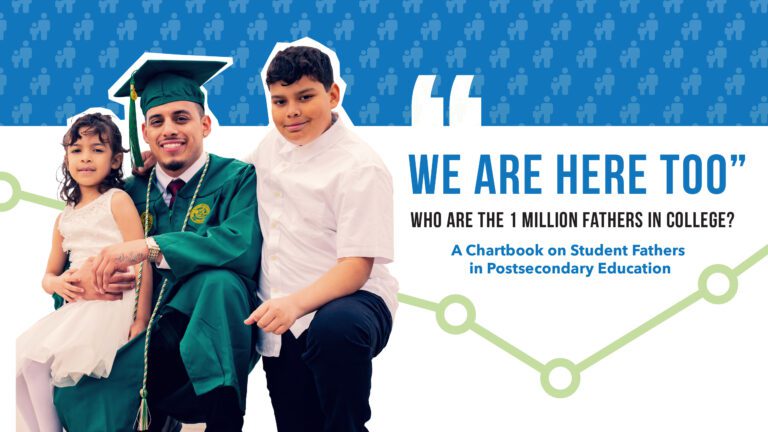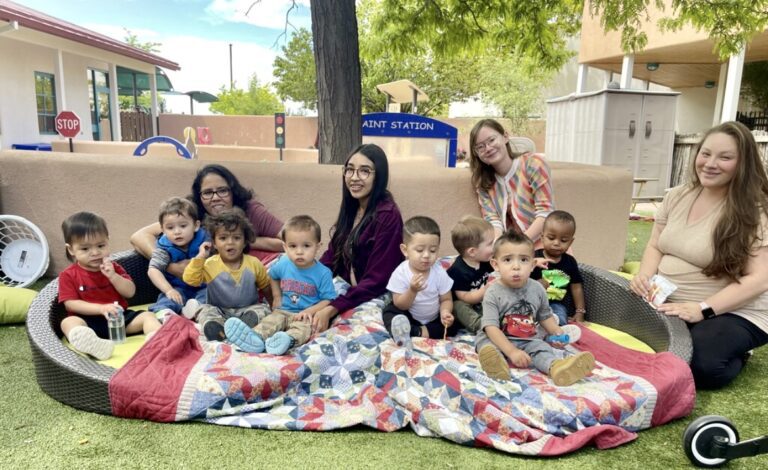A Leadership Imperative: Postsecondary Success for Parents Launches Its Next Phase
More than half of the nearly 4 million student parents in the U.S. are students of color, with Black, Native, and Latino students among the most likely to be raising children while in college. In fact, one-third of all Black college students in the U.S. are parents. When higher education is not designed with parents in mind, these are the students – and potential students – who are most affected.

Since joining Ascend at the Aspen Institute to launch the Postsecondary Success for Parents (PSP) Initiative back in 2018, I‘ve been motivated by my immediate family and their journey. I grew up in the back of a college classroom, tagging along as my mom worked to get her degree. My mother, Jackie Croom, decided to go back to school after I was born. She was a secretary at a large information technology firm and wanted something more. As many student parents do, she started at community college – Miami Dade (Community) College – and then transferred to Florida International University to get her bachelor’s degree in business administration.
Although student parents like my mom are a large and diverse group, they all have one thing in common: a desire to make a better life for themselves and their families. Student parents are distinctly aware of the difference attaining a college degree can make in their family’s future. Whether in individual stories or in surveys, student parents consistently demonstrate their determination to complete a degree, often evidenced by achieving better grades than students without children. But despite their talent and commitment, less than half of student parents get the credentials that they seek.
Either due to resource constraints or a lack of awareness, higher education institutions often leave student parents behind. And for institutions working to improve access and equity, neglecting student parents makes their task impossible.
Taking Action to Increase Student Parent Success
Since 2018, we’ve worked to make the case that not only are student parents worthy of investment, investing in their success is key to a better future for all of us. Now, we’re launching our next, expanded phase of work to achieve systemic change for student parents.
In this next phase, our main goal is to establish a shared priority within and across postsecondary systems to increase attainment rates for parents through solutions that are parent-informed, have potential to scale, and will lead to high-quality learning and family well-being. With an expanded agenda focused on effective movement building, engaging parent expertise, shaping institutional practice, and pursuing systems and policy change, we want to channel increasing interest in addressing the needs of student parents toward concrete action that give parents a better chance of success.
Building on Progress: Why the Moment for Student Parent Success is Now
Here’s what we have learned about achieving change for student parents that lights our path ahead:
Postsecondary systems need an imperative – a deeper understanding, more resources, and a specific attainment goal – to support parents. One of the biggest hurdles in making the case for more support for student parents is a lack of data. Most institutions don’t track the parenting status of their students, a practice that quite literally renders student parents invisible. Encouraging more institutions to capture data on their parenting students has been a key priority for the broader movement – and we are beginning to see real impact. Oregon was the first state to require all of its postsecondary institutions to track parenting data, an effort driven by Ascend Parent Advisor and student parent advocate Michaela Martin. Illinois has since followed suit, with more states expressing interest. (Listen to Michaela share her story on the 1 in 5 podcast.)
Although COVID-19 wrought havoc on parents’ ability to stay enrolled, the pandemic also brought newfound attention to parenting and caregiving. Relief and recovery bills sent a significant infusion (billions) of federal resources into colleges. These funds – often aimed at supporting first-generation students, students of color, and those with low-incomes, groups that are also disproportionately student parents – can and should be targeted to student parent success.
Increased attention to racial inequities in higher education creates an opening to center student parents in equity conversations. Due to the events leading up to and after the murder of George Floyd in 2020, many systems, such as higher education, have been revisiting their histories and connections to perpetuating racial disparities. Student parents are primarily women of color – 40% of all Black women in college are mothers – and investing in their success addresses entrenched gender and racial inequities that many institutions have committed to tackling. With three in four Black mothers serving as breadwinners for their families, investing in Black women is an investment in future generations.
A broader sector of postsecondary providers need to see themselves as part of the student parent equation. Currently, student parents are seen narrowly as an “access” population which offers a limiting frame for understanding such a large and diverse group of students. Although the majority of student parents are enrolled in community college, nearly one in three attend a four-year college or university, a number that has increased over time. Community colleges know that many of their students are parents, and have demonstrated a deep desire to support their success, but more selective institutions drive the media and policy attention that can generate the investment needed to redesign higher education to be more family friendly. In addition, parents are highly motivated to develop critical skills so they can enter careers that allow them to make a better future for their families, but workforce development programs are often not designed with them in mind. As so many higher education institutions confront enrollment and completion challenges exacerbated by the pandemic, broadening the frame on parents can help more selective institutions and workforce providers see student parents as a priority population.
Harnessing this Moment: Our Strategy to Transform Higher Education for Student Parents
Building on PSP’s growing field-level momentum, trusted relationships, and track record, our work is an explicit, unwavering, and unapologetic call to action for parents’ postsecondary success and economic mobility.
Here’s how our expanded commitment to student parent success will advance change for student parents:

Movement Building – We will move the field toward a more explicit focus on attainment for student parents by establishing an imperative. We will also continue to produce useful resources that equip student parent champions with the tools they need to make the case for action and investment, including Season 2 of Ascend’s highly rated “1 in 5” podcast, which explores the compelling, multidimensional stories of student parents as they navigate school, work, parenting, and life. (Listen to season one and subscribe now.)

Systems and Policy Change – We will push the federal government, key state agencies/legislatures, counties, and cities to take concrete action. Through the Ascend Policy Acceleration Partnerships, public entities representing various cities, counties, and states commit to increasing economic mobility and well-being for students who are parents.

Parent Engagement and Expertise – Parent stories, voices, and experiences will continue to be the foundation for our movement. Our new cohort of 11 Parent Advisors, will help shape Ascend’s expanded agenda to improve higher education policy and practice for student parents. From New York City to North Dakota and beyond, these Parent Advisors reflect the varied experiences and dreams of the one in five college students raising children. Parent Advisors will also have decision-making roles in the Parent-Powered Solutions Fund, a student parent-led fund dedicated to advancing the work of organizations and initiatives that support student parents’ postsecondary success.

Institutional Practice – We will elevate student parent success among college leaders while prioritizing resources for the most under-resourced institutions. The Black and Native Family Futures Fund is a newly launched capacity building fund that will provide financial support and expert technical assistance to selected Historically Black Colleges and Universities (HBCUs) and Tribal Colleges and Universities (TCUs) campuses that are committed to improving the success of their student parents. We will also release an institutional playbook from our Postsecondary Leadership Circle in the coming months.
When a student parent succeeds, we know that the ripple effects echo for generations. As Angelina Kerry, a student mother from Boston, said, “When I sat down with my kids and I told them, mommy’s planning to go back to school…I said, the same way you guys are learning, mommy is going to learn and, show you guys that if mommy can do it, you guys can do it.” I know she’s right because that was my story too – and the story of many children, who pursued college because their parents showed them they could.
Together with parents and partners, we seek no less than the transformative change that student parents show us on a daily basis that they deserve – and that we all will benefit from.
Related Posts















